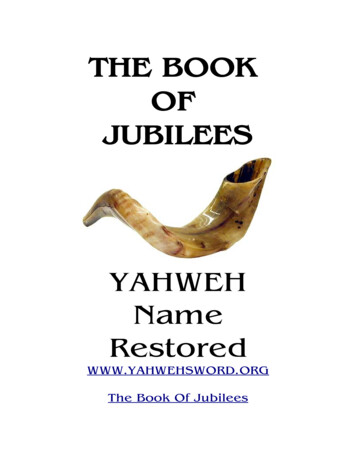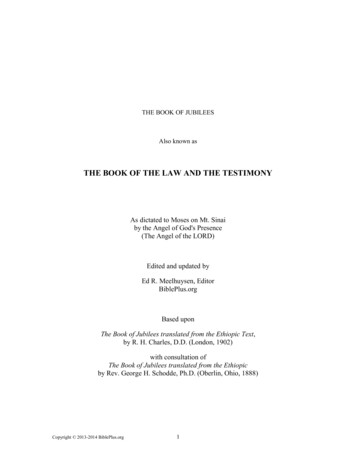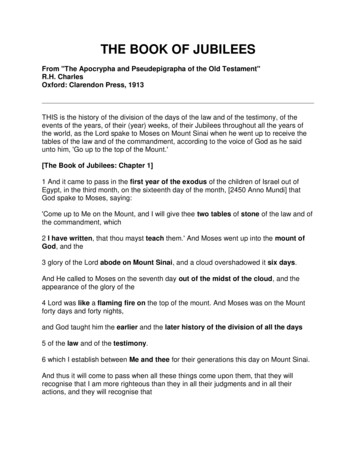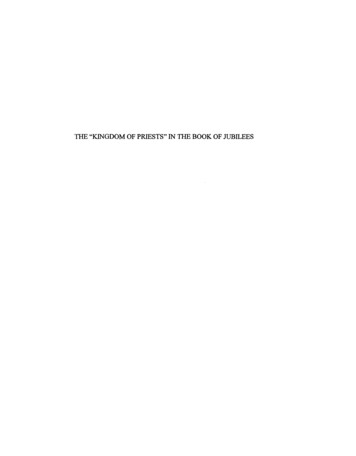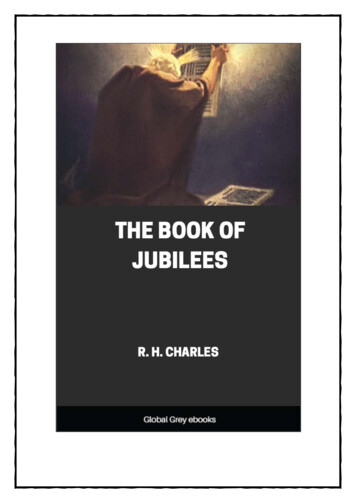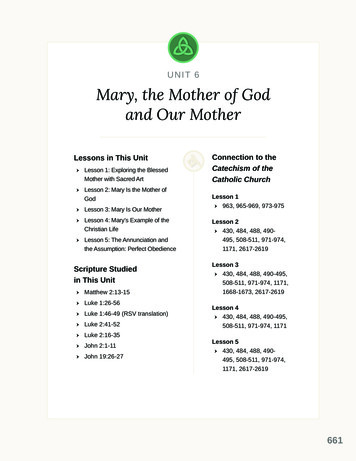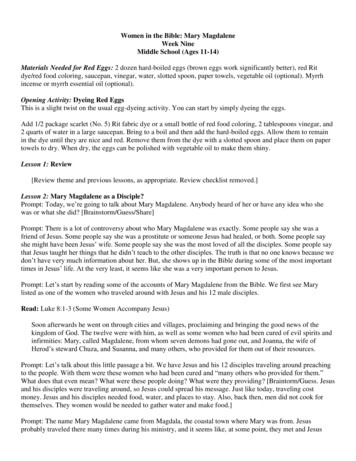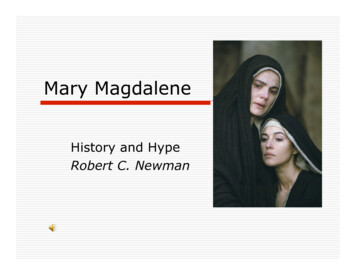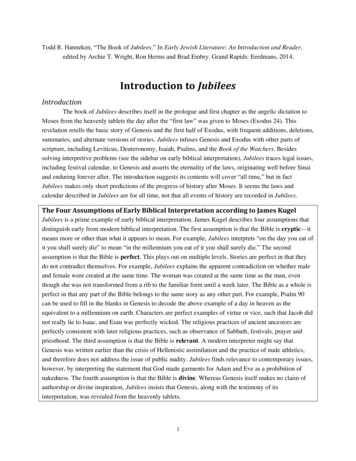
Transcription
Todd R. Hanneken, “The Book of Jubilees.” In Early Jewish Literature: An Introduction and Reader,edited by Archie T. Wright, Ron Herms and Brad Embry. Grand Rapids: Eerdmans, 2014.Introduction to JubileesIntroductionThe book of Jubilees describes itself in the prologue and first chapter as the angelic dictation toMoses from the heavenly tablets the day after the “first law” was given to Moses (Exodus 24). Thisrevelation retells the basic story of Genesis and the first half of Exodus, with frequent additions, deletions,summaries, and alternate versions of stories. Jubilees infuses Genesis and Exodus with other parts ofscripture, including Leviticus, Deuteronomy, Isaiah, Psalms, and the Book of the Watchers. Besidessolving interpretive problems (see the sidebar on early biblical interpretation), Jubilees traces legal issues,including festival calendar, to Genesis and asserts the eternality of the laws, originating well before Sinaiand enduring forever after. The introduction suggests its contents will cover “all time,” but in factJubilees makes only short predictions of the progress of history after Moses. It seems the laws andcalendar described in Jubilees are for all time, not that all events of history are recorded in Jubilees.The Four Assumptions of Early Biblical Interpretation according to James KugelJubilees is a prime example of early biblical interpretation. James Kugel describes four assumptions thatdistinguish early from modern biblical interpretation. The first assumption is that the Bible is cryptic—itmeans more or other than what it appears to mean. For example, Jubilees interprets “on the day you eat ofit you shall surely die” to mean “in the millennium you eat of it you shall surely die.” The secondassumption is that the Bible is perfect. This plays out on multiple levels. Stories are perfect in that theydo not contradict themselves. For example, Jubilees explains the apparent contradiction on whether maleand female were created at the same time. The woman was created at the same time as the man, eventhough she was not transformed from a rib to the familiar form until a week later. The Bible as a whole isperfect in that any part of the Bible belongs to the same story as any other part. For example, Psalm 90can be used to fill in the blanks in Genesis to decode the above example of a day in heaven as theequivalent to a millennium on earth. Characters are perfect examples of virtue or vice, such that Jacob didnot really lie to Isaac, and Esau was perfectly wicked. The religious practices of ancient ancestors areperfectly consistent with later religious practices, such as observance of Sabbath, festivals, prayer andpriesthood. The third assumption is that the Bible is relevant. A modern interpreter might say thatGenesis was written earlier than the crisis of Hellenistic assimilation and the practice of nude athletics,and therefore does not address the issue of public nudity. Jubilees finds relevance to contemporary issues,however, by interpreting the statement that God made garments for Adam and Eve as a prohibition ofnakedness. The fourth assumption is that the Bible is divine. Whereas Genesis itself makes no claim ofauthorship or divine inspiration, Jubilees insists that Genesis, along with the testimony of itsinterpretation, was revealed from the heavenly tablets.1
Date and PurposeAntiochus EpiphanesKing Antiochus IV Epiphanes ruled the Seleucid Empire from 175–164 BCE. He is remembered in Jewishsources (especially 1–2 Maccabees, Daniel, and Josephus) as a bad king, with the possible exception ofrepentance on his deathbed. Between his persistent need of funding for his military campaigns and hispromotion of Hellenistic culture, he was frequently in conflict with Jerusalem, particularly the Templeand the high priesthood. His suppression of Jewish religious independence led to the Maccabean revolt.Jubilees is part of the flourishing of literary activity around the time of the Maccabean revolt. Thebook reflects the Hellenistic crisis and at least some of the events under the reign of AntiochusEpiphanes (175–164 BCE), such as the crisis over the high priesthood, civil war, and invasion. Acomparison with 1 Maccabees shows many parallels and echoes with events of the 160s BCE, perhaps upto the peaceful retreat of the Seleucid army in 159. Jubilees seems not to be aware of Jonathan’sconsolidation of the high priesthood and kingship in 152, although some scholars believe the book, or itsfinal form, was completed shortly before the oldest known copy of the book from the last quarter of thesecond century BCE. Even though the book is not an account of recent events, the Maccabean revoltsignificantly influences the ideas of the book. Consequently, the book can be compared to other responsesto the revolt, such as the Animal Apocalypse, Daniel, and 1–2 Maccabees.If, as seems likely, the book was composed between 159 and 152 BCE, it gives us special insightinto the transitional period in Judaism in which there is no recorded high priest (called theintersacerdotium), the Hasmonean dynasty had not yet been established, Seleucid political presence wasreduced, and Judea was recovering from devastating war and famine. It stands to reason that this was atime of reconstruction in which Jubilees’ proposals on theological and legal (including calendarical)issues were made in a relative vacuum. This would explain the lack of sectarian polemic against otherJews, and strong emphasis on Jewish unity. Within a matter of decades, powerful voices would develop inJudaism and reject the positions in Jubilees. Those who continued to accept the legitimacy of Jubileeswould become marginalized. Consequently, Jubilees is central to understanding the development ofJewish sectarianism in the Hasmonean period, and should probably be viewed as representative of theearly cusp of views that were not yet marginalized or suppressed by a dominant authority.Jubilees seems to assume an audience that already accepts the authority of the Torah and theimportance of following it according to one interpretation or another. For example, part of the debateabout circumcision is not whether to practice it, but whether it could be rescheduled from the eighth day(presumably for reasons such as Sabbath or illness). Even if the first–hand audience consisted of religiousJews, the book also responds indirectly to the Hellenistic assimilationists whose position is described in 1Maccabees 1:11–15.In those days certain renegades came out from Israel and misled many,saying, “Let us go and make a covenant with the Gentiles around us, forsince we separated from them many disasters have come upon us.” Thisproposal pleased them, and some of the people eagerly went to the king,who authorized them to observe the ordinances of the Gentiles. So theybuilt a gymnasium in Jerusalem, according to Gentile custom, and2
removed the marks of circumcision, and abandoned the holy covenant.They joined with the Gentiles and sold themselves to do evil. (NRSV)Several of the emphases in Jubilees can be understood as responses to this position. First, Jubilees callsfor absolute separation from gentiles, and specifically rejects the suggestion of a covenant between Isaacand the Philistines in Genesis. Jubilees also rejects “since we separated” by insisting that Israel wasseparated from all the other nations by God from the first week of creation, and destined to remainseparated forever. Jubilees 1 and 23 explain “disasters” as punishment for failure to separate fromgentiles. The gentile gymnasium (which included nude athletics) and foregoing of circumcision areemphatically rejected in Jubilees.Author and AudienceMost scholars believe the book of Jubilees as we have it is the work of a single author who drewupon and reworked multiple sources. The author valued synthesis of received traditions more thanoriginality. The attempt to reconcile traditions and interpretations in tension left certain seams in the finalproduct. The work is complex and uses different rhetorical and literary styles, but coheres thoroughly insubstance. It is possible, as some scholars believe, that different individuals are responsible for differentsections, but they must have been very like-minded individuals.The author leaves no autobiographical statements, but it stands to reason that the author hadhimself and his work in mind in describing the commission of the Levites, “[Jacob] gave all his books andthe books of his fathers to his son Levi so that he could preserve them and renew them for his sons untiltoday” (Jub. 45:16). The book also praises Levi and priests at length. Jubilees treats Levi as a priest andgenerally does not distinguish between priests and Levites, so there is a lack of evidence by which tospeculate if the author was a priest. The author’s ideas generally fit with what little we know about theHasidim. In later times the Essenes would agree with Jubilees on many issues. It stands to reason thatJubilees influenced the Essenes, but that does not mean the author identified with this or any sect. Theemphasis on Jewish unity indicates the author predates or resists such sectarian divisions.There have been no thorough studies of the social setting of Jubilees, but some elements may beconsistent with the results of sociological studies of Ben Sira, earlier in the second century. The book bothpromotes and reflects thorough study, and is so complex that sustained instruction would have beennecessary to fully appreciate it. The emphasis on choosing a proper wife may have been particularlysalient for adolescent males. The repeated descriptions of learning to read and write function primarily toreinforce the authority, antiquity, and reliability of the written word, going back to the heavenly tablets.Secondarily, however, the many instances of angels and parents teaching must reflect the circumstance ofthe author in some way (perhaps even an academic calendar in Jub. 12:27, where Abraham studies duringthe six rainy months). It would be impossible to speak precisely of “schools” in Jubilees. If anything, theimagery of teaching “all Israel” and lack of elitism would suggest a more public form of instruction thanwhat Ben Sira seems to reflect. This issue remains a desideratum for future study.Text, Transmission, and InfluenceJubilees was written in Hebrew. Fourteen Hebrew copies were found near Qumran (see especiallyDJD 13 [1994]). Although these manuscripts preserve only a small portion of the complete work, they3
support the general reliability of the Ethiopic version. From Hebrew the work was copied into Greek andperhaps Syriac, and from Greek into Latin and Ethiopic. Citations are preserved in several Greek andSyriac works. Part of one Latin copy has survived. Twenty-seven copies, some going back to about thefourteenth century, were preserved in Ethiopic and were used to produce J.C. VanderKam’s definitivecritical text and English translation (1989), which is used in this introduction and reader. R.H. Charles’translation (1902, 1917) is widely available because it is in the public domain. A translation also appearsin The Old Testament Pseudepigrapha (1985).Jubilees was cited and used as authoritative scripture in the Damascus Document and other textsamong the Dead Sea Scrolls. In the subsequent centuries it would retain this authoritative status only inthe Church of Ethiopia. Although echoes of use (more for trivia than as scriptural authority) can be foundin other areas of Judaism and Christianity, the book largely fell out of circulation, and was lost toEuropeans until it was “discovered” by missionaries to Ethiopia and gained scholarly attention in thelatter half of the nineteenth century. The claim of angelic dictation to Moses was rejected by Europeans,who placed it in the category “Pseudepigrapha” (falsely attributed writings).Even though Jubilees is not used in Rabbinic Literature, the New Testament, or most Jewish andChristian writings, Jubilees is helpful for understanding the intellectual milieu of Judaism in antiquity.Scholars have often noted the differences between Jubilees and the Mishnah on legal rulings, but it couldalso be noted that many of the questions and methods reflect common discourse. Many of the narrativeexpansions and interpretations in rabbinic literature are first attested in Jubilees. The rabbinic idea of OralTorah can be compared to the premise of Jubilees, an expansive testimony given to Moses in addition tothe Torah, although the differences are substantial. Similarly, Jubilees seems not to have been used by theauthors of the New Testament, but does reflect several theological debates and ideas picked up in the NewTestament. For example, Jubilees exemplifies the methods of biblical interpretation found especially inpassages such as Stephen’s speech in Acts 7. Jubilees casts light on Jewish interpretation of the Book ofthe Watchers, and ideas about the agency of angels and demons. Certain ideas or motifs presumed in theNew Testament, such as angelic mediation of the Torah at Sinai, are attested first or only in Jubilees. Awork as long and coherent as Jubilees offers invaluable insight into the history of Jewish thought andliterature, even if the specific positions proposed were excluded from the forms of Judaism andChristianity that retained dominance.TheologyJubilees adapts the portrayal of God in Genesis and Exodus to maintain God’s absoluteomniscience, omnipotence, and transcendence. For example, God went through no process of discoveryor learning in finding a partner for Adam or determining the wickedness of Sodom. God does not havepartners in creation, such as angels or elements of creation bringing forth other elements of creation. Godis removed from unbecoming deeds, such as trying to kill Moses and hardening Pharaoh’s heart. Jubileesalso establishes at length God’s perfect justice. Sinners are warned before their judgment. The punishmentfor crimes is fixed and absolute (although Israel has the opportunity for atonement). Judgment is notdelayed or deferred until a final day of judgment. Jubilees often makes use of angels and demons, adaptedfrom the tradition exemplified by the Book of the Watchers, in order to maintain God’s transcendence and4
justice. Mastema, a figure resembling the accuser (satan) in the prologue to Job, takes on the unbecomingroles attributed to God. Demons serve the purpose of punishing the wicked, especially the gentiles butalso Jews who draw near to gentiles. Demons do not have power over the righteous or explain unjustsuffering. Mastema takes the shame for inciting the Egyptians to pursue the Israelites into the sea, butdoes not get credit for any successful evil against Israel, such as throwing babies into the Nile. In general,angels are relevant as mediators of a transcendent and omnipotent God. They carry out God’s plan, butthey do not impinge on human responsibility, or interfere in the direct relationship between God andIsrael.MastemaThe figure of Mastema first appears in the book of Jubilees, usually as “Prince Mastema” or“prince of Mastema.” The word is attested earlier in Hosea 9 as a common noun meaning “hostility.” InJubilees the figure is a member of the heavenly court who is responsible for punishment and evil spirits.Mastema appears whenever unbecoming actions are attributed to God in Genesis-Exodus. Mastema islinked to the rise of idolatry in the generations before Abraham (cf. Joshua 24:2), and becomes the foil forAbraham’s defeat of idolatry. Mastema takes on the role of the accuser in the prologue to Job, whichexplains the real reason why an omniscient God would propose such a cruel test as the sacrifice of Isaac.Mastema, rather than God, tries and fails to kill Moses on the way to Egypt. Jubilees uses the figure toexplain why the Egyptian magicians are able to perform some plagues. Mastema, not God, is directlyresponsible for the hardening of Pharaoh’s heart and the massacres attributed to God in Exodus. In allcases, Mastema is put to shame and easily bound whenever his services are not required.SummaryFor length, coherence, and antiquity, Jubilees is one of the most significant works of early Jewishliterature. It represents a major stage in Jewish history, as Jerusalem emerged from a crisis ofconfrontation with Hellenistic culture and empire. Jubilees finds a plan for Jewish identity in theinterpretation of the traditional books. At the same time, Jubilees solves problems in Genesis and Exodus,particularly when God or national heroes appear in unflattering light. Jubilees reconstructs the heavenlytablets that dictate God’s perfect justice and the proper behavior for God’s people. Even as most ofJudaism and Christianity went on to reject the claim of revelation and many of the teachings, the samebasic tools of narrative and legal exegesis continued to thrive. Through those Jews who did accept theheavenly tablets as presented therein, the book would go on to be copied, cited, rewritten, and interpretedas scripture. Jubilees is therefore essential to understanding the communities that produced the Dead SeaScrolls. The study of Jubilees can also give us broader insight into the formation of group identity,including early Christianity, based on claims of revelation, biblical interpretation, and legal innovation.Discussion Questions1) Most biblical interpretation today claims to be the product of human study, with little or no divineinspiration relative to the interpreted text. Jubilees, however, claims to have been revealed fromthe same basic source, at the same basic time as the Torah. Does this claim to authority enhance,5
diminish, or displace the authority of Genesis? Was the author of Jubilees lying when claimingthe book was revealed to Moses at Sinai?2) How does Jubilees compare to other Jewish texts that deal with questions of the properrelationship to Greek culture?3) What are the implications of the claim that Jewish laws and institutions were established longbefore the time of Moses?4) How is “instruction” portrayed in Jubilees, and what might that indicate about instruction at thetime of composition, or the social function of the book itself?Further ReadingsKugel, James L. The Bible As It Was. Cambridge, Mass.: Belknap Press, 1997.————. A Walk through Jubilees: Studies in the Book of Jubilees and the World of its Creation.Journal for the Study of Judaism Supplement Series 156. Leiden: Brill, 2012.Hanneken, Todd R. The Subversion of the Apocalypses in the Book of Jubilees. Early Judaism and ItsLiterature 34. Atlanta: Society of Biblical Literature, 2012.Himmelfarb, Martha. A Kingdom of Priests: Ancestry and Merit in Ancient Judaism, Jewish Culture andContexts. Philadelphia: University of Pennsylvania Press, 2006.VanderKam, James C. The Book of Jubilees: A Critical Text. 2 vols. Lovanii: E. Peeters, 1989.————. “The Origins and Purposes of the Book of Jubilees.” Pages 3–24 in Studies in the Book ofJubilees. Edited by Matthias Albani, Jörg Frey and Armin Lange. Tübingen: Mohr Siebeck, 1997.————. From Revelation to Canon: Studies in the Hebrew Bible and Second Temple Literature,Journal for the Study of Judaism Supplement Series 62. Leiden; Boston: Brill, 2000.————. The Book of Jubilees, Guides to Apocrypha and Pseudepigrapha. Sheffield: SheffieldAcademic Press, 2001.Advanced ReadingsBoccaccini, Gabriele, and Giovanni Ibba, eds. Enoch and the Mosaic Torah: The Evidence of Jubilees.Grand Rapids: Eerdmans, 2009.Endres, John C. Biblical Interpretation in the Book of Jubilees, Catholic Biblical Quarterly ManuscriptSeries 18. Washington, DC: Catholic Biblical Association of America, 1987.García Martínez, Florentino. “The Heavenly Tablets in the Book of Jubilees.” Pages 243–260 in Studiesin the Book of Jubilees. Edited by Matthias Albani, Jörg Frey and Armin Lange. Tübingen: MohrSiebeck, 1997.Halpern-Amaru, Betsy. The Empowerment of Women in the Book of Jubilees, Journal for the Study ofJudaism Supplement Series 60. Leiden; Boston: Brill, 1999.Himmelfarb, Martha. “Torah, Testimony, and Heavenly Tablets: The Claim to Authority of the Book ofJubilees.” Pages 19–29 in A Multiform Heritage: Studies on Early Judaism and Christianity inHonor of Robert A. Kraft. Edited by Benjamin G. Wright. Atlanta: Scholars Press, 1999.Najman, Hindy. “Interpretation as Primordial Writing: Jubilees and Its Authority Conferring Strategies.”JSJ 30 (1999): 379–410.Ruiten, J. T. A. G. M. van. Primaeval History Interpreted: The Rewriting of Genesis 1–11 in the Book ofJubilees, Journal for the Study of Judaism Supplement Series 66. Leiden; Boston: Brill, 2000.Segal, Michael. The Book of Jubilees: Rewritten Bible, Redaction, Ideology and Theology, Journal for theStudy of Judaism Supplement Series 117. Leiden; Boston: Brill, 2007.VanderKam, James C., and Jozef T. Milik. “Jubilees.” Pages 1–185 in Qumran Cave 4:ParabiblicalTexts Part 1, edited by Harold W. Attridge, Torleif Elgvin, Jozef Milik, Saul M. Olyan, JohnStrugnell, Emanuel Tov, James C. VanderKam and Richard T. White. Oxford: Clarendon, 1994.6
Jubilees Prologue through Chapter 6Translation by James C. VanderKamNotes by Todd R. HannekenPrologue and SettingThese are the words regarding the divisions of the times1 of the law and of the testimony, of theevents of the years, of the weeks of their jubilees throughout all the years of eternity as he related (them)to Moses on Mt. Sinai when he went up to receive the stone tablets—the law and the commandments—onthe Lord’s orders as he had told him that he should come up to the summit of the mountain.1:1 During the first year of the Israelites’ exodus from Egypt, in the third month—on thesixteenth of the month2—the Lord said to Moses: “Come up to me on the mountain. I will give you thetwo stone tablets of the law and the commandments which I have written so that you may teach them.”1:2 So Moses went up the mountain of the Lord. The glory of the Lord took up residence on Mt. Sinai,and a cloud covered it for six days. 1:3 When he summoned Moses into the cloud on the seventh day, hesaw the glory of the Lord like a fire blazing on the summit of the mountain. 1:4 Moses remained on themountain for forty days and forty nights while the Lord showed him what (had happened) beforehand aswell as what was to come. He related to him the divisions of all the times—both of the law and of thetestimony. 1:5 He said to him: “Pay attention to all the words which I tell you on this mountain. Write(them) in a book so that their offspring may see that I have not abandoned them because of all the evilthey have done in straying from the covenant between me and you which I am making today on Mt. Sinaifor their offspring. 1:6 So it will be that when all of these things befall them they will recognize that Ihave been more faithful than they in all their judgments and in all their actions. They will recognize that Ihave indeed been with them.Sin, Punishment, Repentance, and Restoration Predicted31:7 “Now you write this entire message which I am telling you today, because I know theirdefiance and their stubbornness (even) before I bring them into the land which I promised by oath toAbraham, Isaac, and Jacob: ‘To your posterity I will give the land which flows with milk and honey’.When they eat and are full, 1:8 they will turn to foreign gods—to ones which will not save them from anyof their afflictions. Then this testimony will serve as evidence. 1:9 For they will forget all mycommandments—everything that I command them—and will follow the nations, their impurities, andtheir shame. They will serve their gods, and (this) will prove an obstacle for them—an affliction, a pain,and a trap. 1:10 Many will be destroyed. They will be captured and will fall into the enemy’s controlbecause they abandoned my statutes, my commandments, my covenantal festivals, my sabbaths, my holythings which I have hallowed for myself among them, my tabernacle, and my temple which I sanctifiedfor myself in the middle of the land so that I could set my name on it and that it could live (there).1Among the Dead Sea Scrolls and the Ethiopic tradition the book is referred to as the book of theDivisions of the Times, or simply, Divisions.2The day after the renewal of the covenant.3The language and theology of this section closely resembles Deuteronomy, especially 31:16–21.7
1:11 They made for themselves high places, (sacred) groves, and carved images; each of them prostratedhimself before his own in order to go astray. They will sacrifice their children to demons and to everyproduct (conceived by) their erring minds. 1:12 I will send witnesses to them so that I may testify to them,but they will not listen and will kill the witnesses. They will persecute those too who study the lawdiligently. They will abrogate everything and will begin to do evil in my presence. 1:13 Then I will hidemy face from them. I will deliver them into the control of the nations for captivity, for booty, and forbeing devoured. I will remove them from the land and disperse them among the nations. 1:14 They willforget all my law, all my commandments, and all my verdicts. They will err regarding the beginning ofthe month, the sabbath, the festival, the jubilee, and the decree.1:15 “After this they will return to me from among the nations with all their minds, all their souls,and all their strength. Then I will gather them from among all the nations, and they will search for me sothat I may be found by them when they have searched for me with all their minds and with all their souls.I will rightly disclose to them abundant peace. 1:16 I will transform them into a righteous plant with allmy mind and with all my soul. They will become a blessing, not a curse; they will become the head, notthe tail. 1:17 I will build my temple among them and will live with them; I will become their God andthey will become my true and righteous people. 1:18 I will neither abandon them nor become alienatedfrom them, for I am the Lord their God.”1:19 Then Moses fell prostrate and prayed and said: “Lord my God, do not allow your people andyour heritage to go along in the error of their minds, and do not deliver them into the control of thenations with the result that they rule over them lest they make them sin against you. 1:20 May yourmercy, Lord, be lifted over your people. Create for them a just spirit. May the spirit of Belial not rule overthem so as to bring charges against them before you and to trap them away from every proper path so thatthey may be destroyed from your presence. 1:21 They are your people and your heritage whom you haverescued from Egyptian control by your great power. Create for them a pure mind and a holy spirit. Maythey not be trapped in their sins from now to eternity.”1:22 Then the Lord said to Moses: “I know their contrary nature, their way of thinking, and theirstubbornness. They will not listen until they acknowledge their sins and the sins of their ancestors.1:23 After this they will return to me in a fully upright manner and with all (their) minds and all (their)souls. I will cut away the foreskins of their minds and the foreskins of their descendants’ minds. I willcreate a holy spirit for them and will purify them in order that they may not turn away from me from thattime forever. 1:24 Their souls will adhere to me and to all my commandments. They will perform mycommandments. I will become their father and they will become my children. 1:25 All of them will becalled children of the living God. Every angel and every spirit will know them. They will know that theyare my children and that I am their father in a just and proper way and that I love them.The Divine Commission of the Book of Jubilees1:26 “Now you write all these words which I tell you on this mountain: what is first and what islast and what is to come during all the divisions of time which are in the law and which are in thetestimony and in the weeks of their jubilees until eternity—until the time when I descend and live withthem throughout all the ages of eternity.”8
1:27 Then he said to an angel of the presence:4 “Dictate to Moses (starting) from the beginning ofthe creation until the time when my temple is built among them throughout the ages of eternity. 1:28 TheLord will appear in the sight of all, and all will know that I am the God of Israel, the father of all Jacob’schildren, and the king on Mt. Zion for the ages of eternity. Then Zion and Jerusalem will become holy.”1:29 The angel of the presence, who was going along in front of the Israelite camp, took thetablets (which told) of the divisions of the years from the time the law and the testimony were created—for the weeks of their jubilees, year by year in their full number, and their jubilees from [the time of thecreation until]5 the time of the new creation when the heavens, the earth, and all their creatures will berenewed like the powers of the sky and like all the creatures of the earth, until the time when the temple ofthe Lord will be created in Jerusalem on Mt. Zion. All the luminaries will be renewed for (the purpose of)healing, health, and blessing for all the elect ones of Israel6 and so that it may remain this way from thattime throughout all the days of the earth.Creation in Six DaysGenesis 1:1 (NRSVadjusted to reflect literal Hebrewtext) In the beginning when Godcreated the heavens and theearth, 1:2 the earth was aformless void and darknesscovered the face of the deep,while a wind from God sweptover the face of the waters.1:3 Then God said, “Let there belight”; and there was light.1:4 And God saw that the lightwas good; and God separated the4Jubilees 2:1 On the Lord’s orders the angel of the presencesaid to Moses: “Write all the words about the creation—how in sixdays the Lord God completed all his works, everything that he hadcreated, and kept sabbath on the seventh day. He sanctified it for allages and set it as a sign for all his works. 2:2 For on the first day hecreated the h
Jubilees 1 and 23 explain "disasters" as punishment for failure to separate from gentiles. The gentile gymnasium (which included nude athletics) and foregoing of circumcision are emphatically rejected in Jubilees. Author and Audience Most scholars believe the book of Jubilees as we have it is the work of a single author who drew
